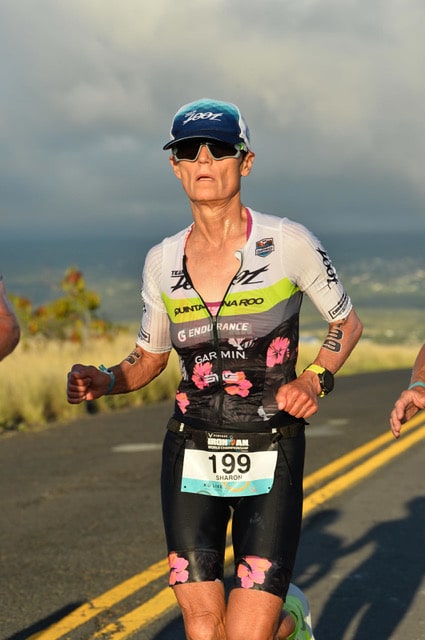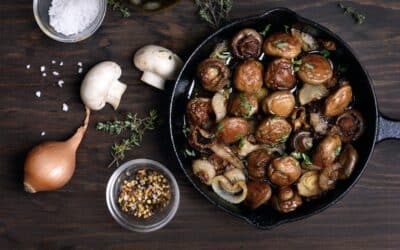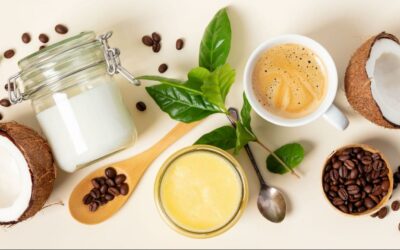As a sports scientist and athlete, I have long been interested in those factors which contribute to performance. In my early years, it was all about training to optimize speed at lactate threshold, VO2 max, endurance, and economy. But little did I know at the time, that for me at least, ditching dairy would be my biggest marginal gain in dairy-free athletic performance.
The year is 2022 and the day is Oct 7th. I have just started the final leg of the Hawaii Ironman World Championships. At eight hours into the race, it has already been a long hot day, made even more difficult by a cross-headwind of hot air blowing off sun-scorched lava fields during the latter half of the 112-mile bike segment. But as I started out on Alii drive for the marathon, it felt like I was running in a sauna. I began to wilt, both mentally and physically.
The first few miles of an Ironman are always the toughest; after two miles you know you still have 24 to go. After 6 miles, 20 miles to go still feels like a yawning chasm. This, combined with the heat and humidity, and I was quickly becoming separated from my will to run. Walking the entire marathon became a distinct possibility. My hopes of a top 5 finish were fading like the shimmering heat waves on the Queen K highway with the setting sun. Mentally I was defeated.
Running up Palani drive before the left turn onto the Queen K highway, my husband told me I was in third, and that first and second were not too far up the road. This shook me out of my mental stupor. I took stock. My legs felt surprisingly good. True, my brain was telling me it was too hot, but at a little over an hour in, I wasn’t feeling any worse. I just had to stay the course, and chip away at this, mile by mile, segment by segment. And thus began my mantra, I AM A MACHINE. My entire focus became putting one foot in front of the other; to ignore the not-so-subtle call of fatigue, to be machine-like. It worked and my pace lifted.
My “I am a machine” mantra was inspired by something Dotsie Bausch said in the Game Changers movie. “I became a machine,” she said, in reference to her training after she switched to a plant-based diet. For some reason, that phrase stuck with me and came to my rescue on the rolling hills of the Queen K in 90+ degree heat.

My journey to the 2022 Hawaii Ironman began almost 40 years ago. I started running for fun and fitness in college. Soon after I took up cycling and swimming and discovered I had a knack for endurance sports. After moving to Colorado, I took up competitive mountain biking, Nordic skiing, and trail running. But as I entered my 40s, things began to go south. At first, it started with some congestion and coughing after a race. Then, I could feel the congestion building during a race. It always happened about 20 min in; my lungs filled with mucus, and a feeling akin to breathing fire. I would be forced to slow down or pull out of the race altogether. After a race, I coughed up mucous for a week. Doctors declared I had a type of exercise-induced asthma and prescribed inhalers. At first, these took the edge off, until they didn’t. At one point I was on three medications (two different types of inhalers and one pill). In desperation, I visited a sports medicine doctor in Boulder, the epicenter for sports medicine gurus. He told me I had over-sensitized alveoli because of years of training. Pushing hard, especially in the cold dry air of Colorado, would cause these sensitized and inflamed alveoli to overproduce mucus. Frankly, there was not much to be done. My days of pushing myself and being competitive appeared to be over.
Right about this time, at the recommendation of a friend, I picked up a book called the China Study. After the first chapter, I was skeptical, after two I was intrigued, after four I was convinced that I needed to make some changes to my diet. The data were too compelling. I was already mostly a vegetarian. But dairy? Well, dairy was the perfect food. I spent a good portion of my childhood on a dairy farm. We had fresh milk delivered to our doorstep every day. Cheese was the nectar of the gods, and chocolate ice cream was the ultimate reward following long hard training sessions or long hard days at work or hard anything.
Thus, it was with some reluctance I informed my husband we were going vegan (thankfully he took it in stride). I wasn’t sure that life would be worth living without my cheese or ice cream but given the associations of dairy to increased risk of breast cancer¹ along with its other health concerns, I was willing to give it a try. The first step was to not bring it home. The next was to navigate restaurant eating. Amazingly, I didn’t collapse from cravings or harbor secret thoughts of killing myself or my husband. Life went on as normal. It was easier than I thought.
About four months after making the switch, I noticed some striking benefits. I had lost the weight I gained (and then some) when I entered my 40s. Indeed, as far as the rest of my diet was going, portion control was not part of the equation. I was showing little to no restraint in that regard. To say I was “eating like I was going to the chair” was putting it mildly. The difference being was that it was all plant-based food. My cholesterol levels, which had been on the rise, plummeted. And then ever so gradually my lung issues began to dissipate. I stopped using the inhalers and taking the medication. I returned to racing my mountain bike and found a whole new lease on my athletic career. Going 100% plant-based was a game changer and ditching my favorite foods was more than worth it. That was 20 years ago, and I haven’t looked back.

Heading back out onto the Queen K highway after surviving the energy lab the sun was getting low on the horizon, taking a slight edge off the heat. With 6 miles to go, my legs still felt fine, I wasn’t hitting the proverbial wall. My mantra continued. With about a mile to go, I made the right turn back onto Palani drive. My husband told me I was in second and that the first-place woman was about a minute ahead. I turned on the afterburners as best I could and emptied the tank to the finish. But I think she knew I was chasing, and she held the gap. I crossed the finish line, completely spent but elated, knowing that my dream of a podium finish in one of the largest female fields in Ironman history, had been realized. Amazingly, my marathon time was only 6 minutes slower than when I had last done this race in 1988, 34 years ago.
Was it ditching the dairy that made all the difference, or some other unaccounted-for variable? Hard to say. I initially gave up all dairy products for health reasons, but the fact that my lung issues were resolved, was a surprising benefit. Regardless, there is some research showing reductions in mucus secretion by going dairy free, although the data are mixed.² ³ (It could be that the type of milk consumed (A1A1 variant, vs. A2A2) plays a role.⁴ Certainly, there are multiple aspects of a plant-based diet that have shown strong links to improved respiratory function and asthma, not the least of which is reductions in saturated fat intake (cheese being the primary suspect here).⁵ ⁶ ⁷ ⁸ The benefits are likely mediated via a variety of factors such as less inflammation and oxidative stress.
Regardless, ditching the dairy was the lynchpin that transformed my life and athletic career and got me across the finish line at the Hawaii Ironman world championships!
Guest blog post written by Sharon McDowell
References
- Fraser, G.E., et al. Dairy, soy, and risk of breast cancer: those confounded milks. Int J Epidemiol 49, 1526-1537 (2020).
- Frosh, A., Cruz, C., Wellsted, D. & Stephens, J. Effect of a dairy diet on nasopharyngeal mucus secretion. Laryngoscope 129, 13-17 (2019).
- Sveiven, S.N., et al. Milk Consumption and Respiratory Function in Asthma Patients: NHANES Analysis 2007-2012. Nutrients 13(2021).
- Yadav, S., et al. Oral Feeding of Cow Milk Containing A1 Variant of β Casein Induces Pulmonary Inflammation in Male Balb/c Mice. Sci Rep 10, 8053 (2020).
- Varraso, R. & Camargo, C.A., Jr. Novel dietary risk factors for asthma. Expert Rev Respir Med 13, 695-698 (2019).
- Andrianasolo, R.M., et al. Association between processed meat intake and asthma symptoms in the French NutriNet-Santé cohort. Eur J Nutr 59, 1553-1562 (2020).
- Guilleminault, L., et al. Diet and Asthma: Is It Time to Adapt Our Message? Nutrients 9(2017).
- Wood, L.G., Garg, M.L. & Gibson, P.G. A high-fat challenge increases airway inflammation and impairs bronchodilator recovery in asthma. J Allergy Clin Immunol 127, 1133-1140 (2011).








